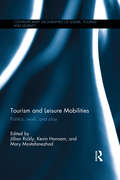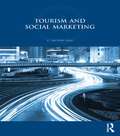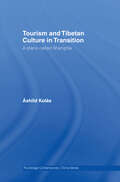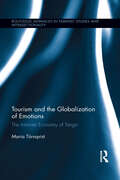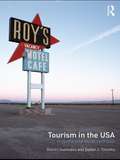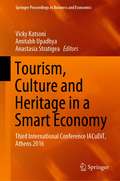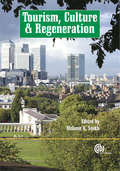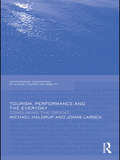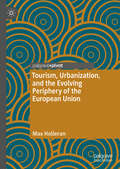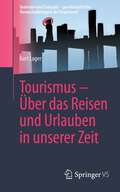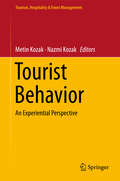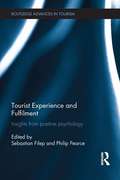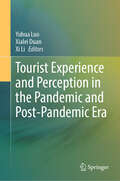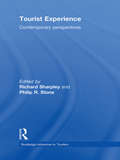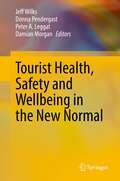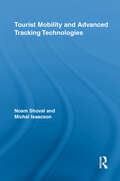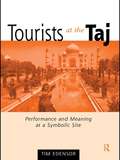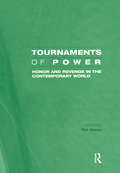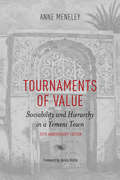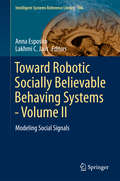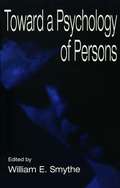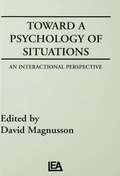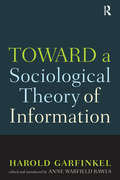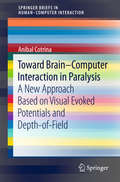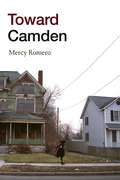- Table View
- List View
Tourism and Leisure Mobilities: Politics, work, and play (Contemporary Geographies of Leisure, Tourism and Mobility)
by Kevin Hannam Jillian Rickly Mary MostafanezhadThis book reframes tourism, as well as leisure, within mobilities studies to challenge the limitations that dichotomous understandings of home/away, work/leisure, and host/guest bring. A mobilities approach to tourism and leisure encourages us to think beyond the mobilities of tourists to ways in which tourism and leisure experiences bring other mobilities into sync, or disorder, and as a result re-conceptualizes social theory. The proposed anthology stretches across academic disciplines and fields of study to illustrate the advantages of multi-disciplinary conversation and, in so doing, it challenges how we approach studies of movement-based phenomena and the concept of scale. Part One examines the ways in which mobility informs and is informed by leisure, from everyday practices to leisure-inspired mobile lifestyles. Part Two investigates individuals and communities that become entrepreneurial in the face of changing tourism contexts and reflects on the performance of work through multiple mobilities. Part Three turns to issues of development, with attention to the cultural politics that frame development encounters in the context of tourism. The varied ways that people move into and out of development projects is mediated by geopolitical discourses hat can both challenge and perpetuate geographic imaginations of tourism destinations.
Tourism and Social Marketing (Routledge International Series in Tourism, Business and Management)
by C. Michael HallSocial Marketing is the utilisation of marketing principles and methods to encourage individual and organisational behaviour change for the public good. Traditionally the domain of government it is increasingly also utilised by non-government and non-profit organisations and other institutions of civil society as a non-regulatory means to achieve policy and public good goals. At a time when concerns over tourism's contribution to undesirable environmental, economic and social change is greater than ever, social marketing strategies are important for encouraging more appropriate and desirable behaviours by tourists and the tourism industry.Tourism and Social Marketing is the first book to comprehensively detail the relevance of social marketing principles and practice to tourism, destination management and marketing. By considering this relationship and application of social marketing approaches to key issues facing contemporary tourism development, such as the environment, this book provides significant insights into how the behaviours of visitors and businesses may be changed so as to develop more sustainable forms of tourism and improve the quality of life of destination communities. It further provides a powerful impetus to the development of tourism related forms of sustainable consumption and the promotion of ethical tourism and marketing. This innovative book is comprehensive in scope by considering a variety of relevant fields relevant to tourism and social marketing practice including, health, non - profit organisations, governance, the politics of marketing and consumption, consumer advocacy and environmental and sustainable marketing. It integrates selected international cases studies to help tourism students engage with the broader debates in social marketing, governance and the politics of behaviour change and shows the relationship of theory to practice.Written by a leading authority in the field, topical and integrative, this book will be valuable reading for students, scholars and researchers in tourism.
Tourism and Tibetan Culture in Transition: A Place called Shangrila (Routledge Contemporary China Series #25)
by Ashild KolasThis book explores the relationship between tourism, culture and ethnic identity in Tibet in , focusing in particular on Shangrila, a Tibetan region in Southwest China, to show how local ‘Tibetan culture’ is reconstructed as a marketable commodity for tourists. It analyses the socio-economic effects of Shangrila tourism in Tibet, investigating who benefits economically, whilest also considering its political implications and the ways in which tourism might be linked to the negotiation and reassertion of ethnic identity. It goes on to examine the spatial re-imagining provoked by the development of tourism, and asks whether a tourist destination inevitably becomes a ‘pseudo-community’ for the visited. Can a fictitious name, invented for the sake of tourists, still provide the ‘natives’ of a place with a sense of identity? This book argues that conceptions of place are closely linked to notions of social identity, and in the case of Shangrila particularly to ethnic identity. Viewing the spatial as socially constructed, and place-making as vital to social organisation, this is a study of how place is constructed and contested. It describes how local villagers and monastic elites have negotiated the area’s religious geography, how agents of the Communist state have redefined it as a minority area, and how tourism developers are now marketing the region as Shangrila for tourist consumption. It outlines the different ‘place-making’ strategies utilised by the various social actors, including local villagers to create the communities in which they live, monastic elites to invent a Buddhist Tibetan realm of ‘religious geography’, agents of the People’s Republic of China to define the area as part of the communist state, and tourism developers to market the region as ‘Shangrila’ for tourist consumption. Overall, this book is an insightful account of the complex links between tourism, culture and Tibetanethnic identity in Tibet, and will be of interest to a wide range of disciplines including social anthropology, sociology, human geography, tourism and development studies.
Tourism and the Globalization of Emotions: The Intimate Economy of Tango (Routledge Advances in Feminist Studies and Intersectionality)
by Maria TörnqvistToday, an increasing number of people from all over the world travel to Buenos Aires to dance tango. To accommodate these intimate voyagers, tourist agencies offer travel packages, including classes in tango instruction, dance shoe shopping, and special city maps pointing out the tango clubs in town. Some of these agencies even provide “taxi dancers” — mainly Argentine men, who make a living by selling themselves as dance escorts to foreign women on a short term stay. Based on a cheek-to-cheek ethnography of intimate life in the tango clubs of Buenos Aires, this book provides a passionate exploration of tango — its sentiments and symbolic orders — as well as a critical investigation of the effects of globalization on intimate economies. Throughout the chapters, the author assesses how, in an explosive economic and political context, people’s emotional lives intermingle with a tourism industry that has formed at the intersection of close embrace dances and dollars. Bringing economies of intimacy centre stage, the book describes how a global condition is lived bodily, emotionally and politically, and offers a rich, provocative contribution to theorizing today’s global flows of people, money, and fragile dreams. As the narrative charts a course across a sea of intense, immediate emotional sensations, taken-for-granted ideas about sex, romance and power twist and turn like the steps of the tango.
Tourism in the USA: A Spatial and Social Synthesis
by Dimitri Ioannides Dallen TimothyThe United States continues to provide opportunities for travel and tourism to domestic and international travellers. This is the first book to offer students a comprehensive overview of both tourism and travel in this region, paying specific attention to the disciplines of Geography, Tourism Studies and, more generally, Social Science. Tourism in the USA explains the evolution of tourism paying attention to the forces that shaped the product that exists today. The focus of the book includes the manner in which tourism has played out in various contexts; the role of federal, state, and local policy is also examined in terms of the effects it has had on the US travel industry and on destinations. The various elements of tourism demand and supply are discussed and the influence that transportation (especially Americans’ high personal mobility rates and love affair with the auto) has had on the sector highlighted. The economics of tourism are fleshed out before focusing more narrowly on both the urban and rural settings where tourism occurs. A look into the manner in which the spatial structure of cities is transformed through tourism is also offered. Additionally, a brief examination of future issues in American tourism is presented along with explanations concerning the ascendancy of tourism as an economic development tool in various areas. The book combines theory and practice as well as integrating a range of useful student orientated resources to aid understanding and spur further debate, which can be used for independent study or in class exercises. These include: ‘Closer Look’ case studies with reflective questions to help show theory in practice and encourage critical thinking about tourism developments in this region ‘Discussion Questions’ at the end of each chapter encourage stimulating debates ‘Further Reading’ sections direct the readers to related book and web resources so that they can learn more about the topics covered in each chapter. Written in an engaging style and supported with visual aids, this book will provide students globally with an in-depth and essential understanding of the complexities of tourism and travel in the USA.
Tourism, Culture and Heritage in a Smart Economy: Third International Conference IACuDiT, Athens 2016 (Springer Proceedings in Business and Economics)
by Vicky Katsoni Anastasia Stratigea Amitabh UpadhyaThis book explores the ways in which information and communication technologies (ICTs) offer a powerful tool for the development of smart tourism. Numerous examples are presented from across the entire spectrum of cultural and heritage tourism, including art, innovations in museum interpretation and collections management, cross-cultural visions, gastronomy, film tourism, dark tourism, sports tourism, and wine tourism. Emphasis is placed on the importance of the smart destinations concept and a knowledge economy driven by innovation, creativity, and entrepreneurship. New modes of tourism management are described, and tourism products, services, and strategies for the stimulation of economic innovation and promotion of knowledge transfer are outlined. The potential of diverse emerging ICTs in this context is clearly explained, covering location-based services, internet of things, smart cities, mobile services, gamification, digital collections and the virtual visitor, social media, social networking, and augmented reality. The book is edited in collaboration with the International Association of Cultural and Digital Tourism (IACuDiT) and includes the proceedings of the Third International Conference on Cultural and Digital Tourism.
Tourism, Culture, and Regeneration
by Melanie K. SmithSustainable and integrated regeneration in the context of culture and tourism is explored for the first time within this book. The text is enhanced by international case studies.
Tourism, Performance and the Everyday: Consuming the Orient (Contemporary Geographies of Leisure, Tourism and Mobility)
by Jonas Larsen Michael HaldrupTourism has become increasingly ‘exotic’, a process made possible by low-cost charter tourism and cheaper air tickets. Faraway and evermore ‘exotic’ holidays are becoming widespread and within reach as destinations make their entry into the mass tourism market. Strolls through the bazaars of Istanbul and cruises on the Nile are packaged into the sea, sand and sun culture of traditional forms of organized mass tourism. At the same time new technologies weave the fabric of tourism and everyday life even closer, circulating images, information, and objects between them. Taking off from this observation, Tourism, Performance and the Everyday invites readers to follow the flow’s of tourist desires, objects, meanings, photographs, fears, dreams and memories weaving together the spaces of and between Western Europe, Turkey and Egypt. Tourism, Performance and the Everyday carefully analyzes the cultural and social impacts of mass-tourist experiences of ‘exotic’ places on the wider aspects of everyday life. It treats mass-tourism as a cultural phenomenon that feeds into the practices and networks of peoples’ everyday lives rather than as an isolated, trivial or ‘exotic’ event. It traces how these impacts are mediated by various mobilities between home and away through innovate mobile and ethnographic research methods at tourist destinations and the home of tourists. The book contains analysis of diaries, photographs, blogs and photo web sharing sites, participant observation of performing tourists and ‘home ethnographies’ of the afterlife tourist photographs, souvenirs and memories. In doing this, the book traces out the multiple interconnections and mobilities between everyday spaces and leisure spaces as well as the multiple ways in which the Orient is consumed on holiday and at home. The book appeals to a wide audience among students, researchers and educators within the social and cultural sciences studying, researching and teaching theories and methods of tourism, Orientalism and cultural encounters as well as broader issues of leisure, consumption and everyday life.
Tourism, Urbanization, and the Evolving Periphery of the European Union
by Max HolleranThis book explores travel, tourism, and urban development at the edges of Europe from the 1970s until the present. It compares tourism-spurred urban growth in Spain and Bulgaria, showing how development in Southern Europe after the fall of dictatorships provided a model for integrating post-socialist Europe in the 1990s. It analyzes the economic, cultural, and political dimensions of tourist economies, showing how they aligned with major European Union integration goals and were supported with EU development funds. It also chronicles the social and environmental costs of mass tourism where over-development has despoiled beachfronts and promoted low paying service jobs, reinforcing regional divisions in Europe between those who host and those who visit. Ultimately, it argues that while mass tourism is touted as a viable economic solution to EU inequality, it can potentially exacerbate disparities between core and peripheral zones, creating new and troubling forms of regional polarization.
Tourismus – Über das Reisen und Urlauben in unserer Zeit (Innovativ und kompakt – gesellschaftliche Herausforderungen der Gegenwart)
by Kurt LugerSpätestens seit den Wiederaufbaujahren nach dem Zweiten Weltkrieg wurde das touristische Reisen Bestandteil des Lebensstils der westlichen Industriegesellschaft. Erholung und Neugier, Welterfahrung und Statusgewinn waren tragende Motive der Reisenden, die Erzielung von Einkommen oder Profit die Interessenskonstellation auf der Seite der mehr oder weniger professionellen Dienstleister, die sich bis heute gerne als Gastgeber titulieren. Tourismus als Gastfreundschaft oder ein profanes Geschäft? Der Nutzen hat aber auch negative Seiten – für Einheimische, die am Tourismus nicht teilhaben und nur vom Verkehr, von den hohen Preisen in der Gastronomie und beim Wohnen betroffen sind. Verlierer ist auch die nicht geschützte Natur, die Umwelt, denn Tourismusinfrastruktur frisst Landschaft. Wie in jeder anderen Branche auch gibt es also Schattenseiten mit dem Geschäft, in dem immer die Sonne zu scheinen scheint. Den vielen Widersprüchlichkeiten nachzugehen, sie aufzuzeigen und zu analysieren, um gewissermaßen einen bewussteren und eigenverantwortlichen Tourismus damit anzustoßen, ist die Absicht dieses Buches.
Tourist Behavior: An International Perspective (Routledge Advances In Tourism Ser.)
by Metin Kozak Nazmi KozakThis book examines and analyzes tourism consumption and tourist experiences, employing a systematic and case study-driven perspective. Covering approaches with a wider geographical background, it considers issues like tourism place experience and co-creation, as well as the behavior of tourists on guided tours, at trade shows and exhibitions, and in museums. Dedicated chapters deal with the aspect of customer satisfaction in places such as hotels or restaurants. In closing, the book highlights tourist behavior in the context of cultural heritage, regional and cultural differences and the general frameworks of consumer happiness and responsibility. Given its focus, the book provides a unique view on the interplay of tourism consumption and tourist experiences, and presents a comprehensive selection of case studies to exemplify and discuss in detail the frameworks covered and the current state of practice.
Tourist Experience and Fulfilment: Insights from Positive Psychology (Advances in Tourism)
by Sebastian Filep Philip PearceWhat makes life worth living? Many people would argue that it is fulfilling experiences. These experiences are characterised by feelings of joy and pleasure, positive relationships and a sense of engagement, meaning and achievement. Tourism is arguably one of the largest self-initiated commercial interventions to promote well being and happiness on the global scale but yet there is absence in the literature on the topic of fulfilling tourist experiences from psychological perspectives.Drawing on insights and theories from the research field of positive psychology (the study of well being), this is the first edited book to evaluate tourist experiences from positive psychology perspectives. The volume addresses the important topic of fulfilment through the lens of the world’s largest social global phenomenon tourism. In doing so, the book refreshes and challenges some aspects of tourist behaviour research. The chapters are grouped under three broad sections which reflect a range of positive psychological outcomes that personal holiday experiences can produce, namely; happiness and humour; meaning and self-actualisation and health and restoration. The book critically explores these fulfilling experiences from interdisciplinary perspectives and includes research studies from wide range of geographical regions. By analysing the contemporary fulfilling tourist experiences the book will provide further understanding of tourist behaviour and experience.Written by leading academics this significant volume will appeal to those interested in Tourism and Positive Psychology.
Tourist Experience and Perception in the Pandemic and Post-Pandemic Era
by Yuhua Luo Xi Li Xialei DuanThis book is a collection of selected papers from the 11th international Conference on Tourism and Hospitality between China and Spain [www.china-spain.org]. The COVID-19 pandemic was a global unprecedented event which was a huge crisis and challenge for the tourism and hospitality industry to confront. This book focuses on the tourist experience and perception during the pandemic time as well as the normal time. The experience and perception can affect the tourist's satisfaction and trust, behavioral intention substantially. They are critical for the decision-making to visit or revisit a tourist destination. The book discusses the experience and perception of the tourists with width and depth. The affecting factors and dimensions for the tourist experience and perception are explored in various types of tourism. Some measurement including quantitative and qualitative measurements for tourist perception is suggested. The book convincingly shows some successful approaches to increase the positive experience and perception of the tourists for sustainable tourism development. The book is highly recommended for tourism and hospitality researchers, policymakers, industry practitioners, and graduate students
Tourist Experience: Contemporary Perspectives (Advances in Tourism)
by Richard SharpleyTo consume tourism is to consume experiences. An understanding of the ways in which tourists experience the places and people they visit is therefore fundamental to the study of the consumption of tourism. Consequently, it is not surprising that attention has long been paid in the tourism literature to particular perspectives on the tourist experience, including demand factors, tourist motivation, typologies of tourists and issues related to authenticity, commodification, image and perception. However, as tourism has continued to expand in both scale and scope, and as tourists’ needs and expectations have become more diverse and complex in response to transformations in the dynamic socio-cultural world of tourism, so too have tourist experiences. Tourist Experience provides a focused analysis into tourist experiences that reflect their ever-increasing diversity and complexity, and their significance and meaning to tourists themselves. Written by leading international scholars, it offers new insights into emergent behaviours, motivations and sought meanings on the part of tourists based on five contemporary themes determined by current research activity in tourism experience: dark tourism experiences, experiencing poor places, sport tourism experiences, writing the tourist experience and researching tourist experiences: methodological approaches. The book critically explores these experiences from multidisciplinary perspectives and includes case studies from a wide range of geographical regions. By analyzing these contemporary tourist experiences, the book will provide further understanding of the consumption of tourism.
Tourist Health, Safety and Wellbeing in the New Normal
by Donna Pendergast Jeff Wilks Peter A. Leggat Damian MorganThe COVID-19 pandemic has changed the face of international and domestic tourism and sharply focused attention on the importance of tourist health, safety and wellbeing like never before. This book offers a unique perspective on the challenges facing the world’s largest service industry to protect and care for customers in a rapidly evolving environment where borders have closed, social distancing rules apply and personal hygiene has become a key focus in everyday life. Yet tourism is a very resilient industry and history shows there is always an immediate surge toward recovery after a crisis has passed. Humans want to travel and see the world. While we appreciate that the pandemic is far from over, already there are reports of pent-up demand for travel as restrictions ease at some destinations and borders begin to open. As we move hopefully toward the recovery phase and people begin to move around for business and pleasure, this book presents the reader with key information and insights in both traditional and emerging areas of tourist health, safety and wellbeing, recognising that the world is now shaped by this pandemic, bringing change, potentially enduring benefits and lasting legacies.
Tourist Mobility and Advanced Tracking Technologies (Routledge Advances in Tourism #19)
by Noam Shoval Michal IsaacsonThe remarkable developments in tracking technologies over the past decade have opened up a wealth of possibilities in terms of research into tourist spatial behaviour. To date, most research in the field has been based on data derived from less objective – hence methodologically problematic – sources. This book examines the various technologies available to track pedestrians and motorized vehicles as well as the moral, ethical and legal issues arising from the utilization of data thus obtained. The methodologies outlined in the book could prove revolutionary in terms of tourism research, management and planning.
Tourists at the Taj: Performance and Meaning at a Symbolic Site (International Library of Sociology)
by Tim EdensorClearly written and fascinatingly illustrated, Tourists at the Taj describes the conflicting narratives which surround the site. For some the Taj is an evocative symbol of the colonial past. For others it is a symbolic centre of Islamic power. For many of the thousands of tourists that visit it each year it is simply a monument of love.The author shows how tourism can be seen as a performance and the tourist site as a stage on which tourists are directed and rehearsed but also able to improvise their own cultural rituals.
Tournaments of Power: Honor and Revenge in the Contemporary World
by Tor AaseThirty years ago, modernization theory contended that notions of honor would become obsolete in modern democracies. Being an archaic remnant of our pre-modern past, honor would be substituted by dignity under modern conditions. When honor does emerge as a valid social theme in modern society, as it sometimes does during court hearings, in gang fights, and in violent reactions to insult, it is often ascribed to immigration from pre-modern cultures where honor still matters in social life. Thus honor becomes part of the cultural baggage that is transfered to the host country through migration. However, the fact that highly modern social formations like MC gangs are also obsessed with honor seriously questions the validity of classical modernization theories. It seems that honor is not just a pre-modern weed in a modern garden of dignity, but an integral part of modernity. Since honor emerges under pre-modern as well as under modern conditions, it is relevant to ask under which circumstances it becomes a theme in interaction. Blurring the distinction between the modern and the pre-modern in this manner allows us to ask what honor is really all about. Containing a wealth of international contributions from Scandinavia, USA, Mexico, Kurdistan, Indonesia, Pakistan, Sri Lanka and Japan, Tournaments of Power provides first-hand ethnographic accounts and important answers to these vital questions.
Tournaments of Value: Sociability and Hierarchy in a Yemeni Town
by Anne MeneleyA significant contribution to our understanding of the varied experience of women in the Islamic Middle East, Tournaments of Value gives a careful description of a world of female socializing, and the velocity, energy, and elaborateness of this remarkable female social world. Meneley's data challenges assumptions about the cross-cultural validity of a division between household and community, between domestic and public domains. She demonstrates the fluidity of social life, the shifting nature of community organization, and in doing so provides a welcome counterpoint to more rigid formulations of Middle Eastern social structure usually expressed in ethnographies. Tournaments of Value incorporates vignettes to illustrate more analytical points and to enliven the text, allowing the reader to enter fully into the rich world of Zabid in Yemen. This expanded 20th anniversary edition introduces this seminal work on Middle Eastern ethnography and women's studies to a new generation of readers.
Toward Robotic Socially Believable Behaving Systems - Volume I
by Lakhmi C. Jain Anna EspositoThis volume is a collection of research studies on the modeling of emotions in complex autonomous systems. Several experts in the field are reporting their efforts and reviewing the literature in order to shed lights on how the processes of coding and decoding emotional states took place in humans, which are the physiological, physical, and psychological variables involved, invent new mathematical models and algorithms to describe them, and motivate these investigations in the light of observable societal changes and needs, such as the aging population and the cost of health care services. The consequences are the implementation of emotionally and socially believable machines, acting as helpers into domestic spheres, where emotions drive behaviors and actions. The contents of the book are highly multidisciplinary since the modeling of emotions in robotic socially believable systems requires a holistic perspective on topics coming from different research domains such as computer science, engineering, sociology, psychology, linguistic, and information communication. The book is of interest both to experts and students since last research works on a so complex multidisciplinary topic are described in a neat and didactical scientific language.
Toward A Psychology of Persons
by William E. SmytheThis closely integrated collection of essays constitutes a wide-ranging and comprehensive attempt to understand persons within psychology--a long-lost enterprise. The volume was inspired by the observation that contemporary psychology has become increasingly depersonalized in its conceptions and its methodology, and has thereby lost touch with its traditional subject matter of human individuality and the nature of persons. This development now threatens the integrity of psychology as a discipline. Using both a critical and constructive approach, the various contributors share two common objectives: *to explore the roots of depersonalization in modern psychology through systematic criticism of contemporary functionalist and neo-functionalist approaches; *to articulate some alternative holistic-interpretive and historical approaches to the psychology of persons. Despite these common objectives, the chapters reflect a wide variety of theoretical perspectives and approaches, including cognitive science and neuroscience, discursive psychology, hermeneutics, social constructionism, semiotics, rhetorical analysis, and psychological aesthetics. These essays do not converge on a unified psychology of persons, but they do serve to reopen a form of discourse that has long been absent from mainstream psychology. This volume emerged from the deliberations of the Western Canadian Theoretical Psychologists (WCTP)--a group of scholars primarily from Western Canadian universities with shared interests in the history and theory of psychology. From its founding in 1989 to the present, the WCTP has been actively engaged in promoting and contributing to the development of theoretical psychology. Over the past half dozen years, scholars have greatly benefitted from the close collaboration and collegial support that participation in the WCTP makes possible. The annual meetings provide an opportunity for them to catch up on each other's work and also to pool their expertise to work on topics of shared interest.
Toward A Psychology of Situations: An Interactional Perspective
by David MagnussonPublished in the year 1981, Toward a Psychology of Situations is a valuable contribution to the field of Social Psychology.
Toward A Sociological Theory of Information
by Harold Garfinkel Anne RawlsIn 1952 at Princeton University, Harold Garfinkel developed a sociological theory of information. Other prominent theories then being worked out at Princeton, including game theory, neglected the social elements of "information," modeling a rational individual whose success depends on completeness of both reason and information. In real life these conditions are not possible and these approaches therefore have always had limited and problematic practical application. Garfinkel's sociological theory treats information as a thoroughly organized social phenomenon in a way that addresses these shortcomings comprehensively. Although famous as a sociologist of everyday life, Garfinkel focuses in this new book-never before published-on the concerns of large-scale organization and decisionmaking. In the fifty years since Garfinkel wrote this treatise, there has been no systematic treatment of the problems and issues he raises. Nor has anyone proposed a theory of information like the one he proposed. Many of the same problems that troubled theorists of information and predictable order in 1952 are still problematic today.
Toward Brain-Computer Interaction in Paralysis
by Anibal CotrinaThis book presents up-to-date information on Brain-computer Interfaces (BCI). BCIs are systems that record brain signals, extract features and translate them into computer commands. For instance, in BCIs based on the steady-state visual evoked potentials (SSVEP-BCI), brain potentials evoked by visual stimuli are used for controlling computer-based devices. Inspired by the optical phenomenon of depth of field, this book introduces, describes, and evaluates a novel way of setting visual stimuli for SSVEP-BCI. It employs two stimuli that were placed at different distances from the subjects so that if one stimulus is focused on, the other one is non-focused. This assessment allows SSVEP-BCI users to modulate their brain signals by shifting their focus because focused and non-focused stimuli evoke different brain potentials. It allows people to send two brain commands with high accuracy rate by shifting their focus. Hence, computer interaction systems can be proposed for people with paralysis, such as patients with amyotrophic lateral sclerosis since focusing mechanism does not demand head, neck, or eyeball movements. The matter assessed in this book that includes offline and online experiments, is useful for researchers in human-machine interaction who are looking for relevant possibilities of improving the quality of life of people in paralysis situation.
Toward Camden (Black Outdoors: Innovations in the Poetics of Study)
by Mercy RomeroIn Toward Camden, Mercy Romero writes about the relationships that make and sustain the largely African American and Puerto Rican Cramer Hill neighborhood in New Jersey where she grew up. She walks the city and writes outdoors to think about the collapse and transformation of property. She revisits lost and empty houses—her family's house, the Walt Whitman House, and the landscape of a vacant lot. Throughout, Romero engages with the aesthetics of fragment and ruin; her writing juts against idioms of redevelopment. She resists narratives of the city that are inextricable from crime and decline and witnesses everyday lives lived at the intersection of spatial and Puerto Rican diasporic memory. Toward Camden travels between what official reports say and what the city's vacant lots withhold.Duke University Press Scholars of Color First Book Award recipient
